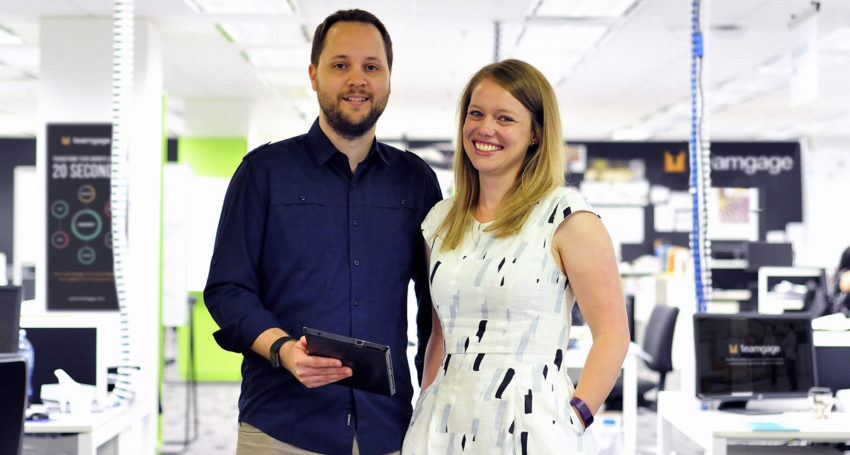Driving continuous business improvement from below
- Written by Andrew Spence

Based in Adelaide, South Australia, Teamgage is a technology platform that aims to instil a culture of continuous improvement at all levels of an organisation from the most junior employee to the CEO.
Teamgage’s digital employee engagement process allows users to submit anonymous feedback through a 20-second interface on a range of customisable metrics such as workload, safety, manager relations and fulfilment. The feedback is added ahead of regular team meetings where it is reviewed by the team.
The company was launched commercially in 2016 by husband and wife team Ben and Noelle Smit. It has now grown to nine staff and is recruiting another four to help drive its rapid expansion.
“Results are presented to management in real time and one of the things we do differently to others in the market is we give those results to the teams as well rather than them submitting feedback that goes up into a black hole within senior management and HR where employees never hear anything about it again, which is often the case,” Ben said.
“They basically own their own improvement cycle instead of the traditional approach of having an initiative pushed down on them from the top.
“Our process says ‘you’ve hired smart people and you’ve got competent teams so go and have them own the improvement process, come up with solutions that they can then cross-pollinate to other teams and push it back up the organisation’.
“What we find is the teams have a much higher ownership of the solution they come up with, even if they come up with the same solution that management would have come up with, the fact that they own the process leads to much higher engagement.”
Teamgage has 33 clients and 30,000 users across Australia, New Zealand and Asia.
Last month it finalised a deal with Chicago-based ZF Chassis Systems, part of the ZF Group, which has more than 130,000 employees across 26 countries.
It is also in talks with Boeing about launching Teamgage across one of its global divisions including licenses in the United States.
Noelle said the ZF Chassis Systems deal grew out of a relationship it formed with ZF Group’s Australian arm when it manufactured components for the automotive industry in Adelaide.
“This one is big for us because the whole deal is US based, which is a first for us,” she said.
“North America is definitely a target so we’re really excited about having our first customers over there.
“We’ll try to grow that base initially from here and once it gets to a substantial size we’ll open an office there and have staff on the ground.”
Teamgage began by building a client base of South Australian companies across a wide range of industries including aged care, mining, health, banking and elite sport.
“We’re still working on expanding deals with the global clients we have in Australia and spearheading into the US. Then we’ll do the same thing in Europe and beyond,” Noelle, the company’s Chief Operating Officer, said.
“We want to be a global company, this is not a unique problem to Australia, the world is changing at a faster pace than ever before.
“Large organisations and their leadership teams know this is happening and they do have a strategy in place to transform their company but they’re struggling to action that across their thousands of employees.”
CEO Ben said although Teamgage’s clients had employee bases ranging from 30 to 10,000, it targeted organisations with 1000 staff or more.
He said one of the challenges for 2018 was how to manage the company’s growth sustainably.
“Last year we were doubling quarter on quarter so if we can sustain a rate anywhere near that we’ll be very happy – obviously there are going to be different challenges at those higher levels – but we are certainly on a quick growth trajectory,” he said.
Ben said the focus of Teamgage was on measuring whatever metrics a business identified as being important, which often varied from industry to industry but also within different departments of the same company.
“Maybe everyone in a company cares about workload and fulfilment but the manufacturing department might be more interested in safety than the sales department,” he said.
“One of the reasons we’ve succeeded to date is because we took a concept from outside the HR industry and brought something new in,” Ben said.
“The shorter cycles mean you can fail on a smaller scale and you can fix things much quicker, you can be more flexible and all of that worked for people.
“They can be leading indicators of potential disasters – safety is one area – if people feel like safety standards are slipping, you catch that before something happens.”











